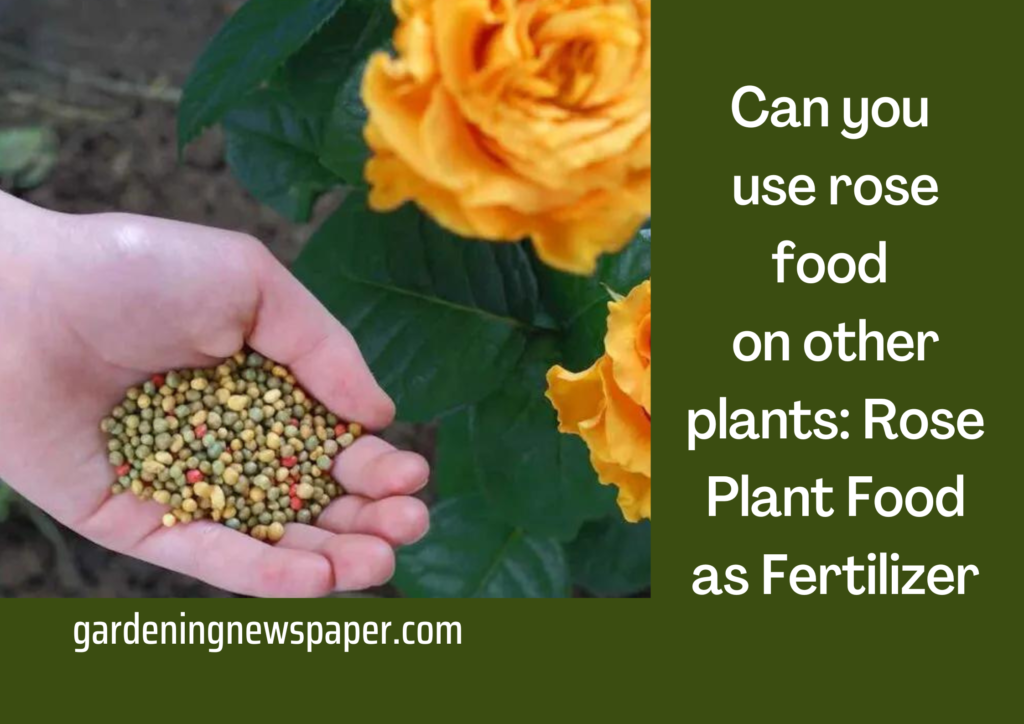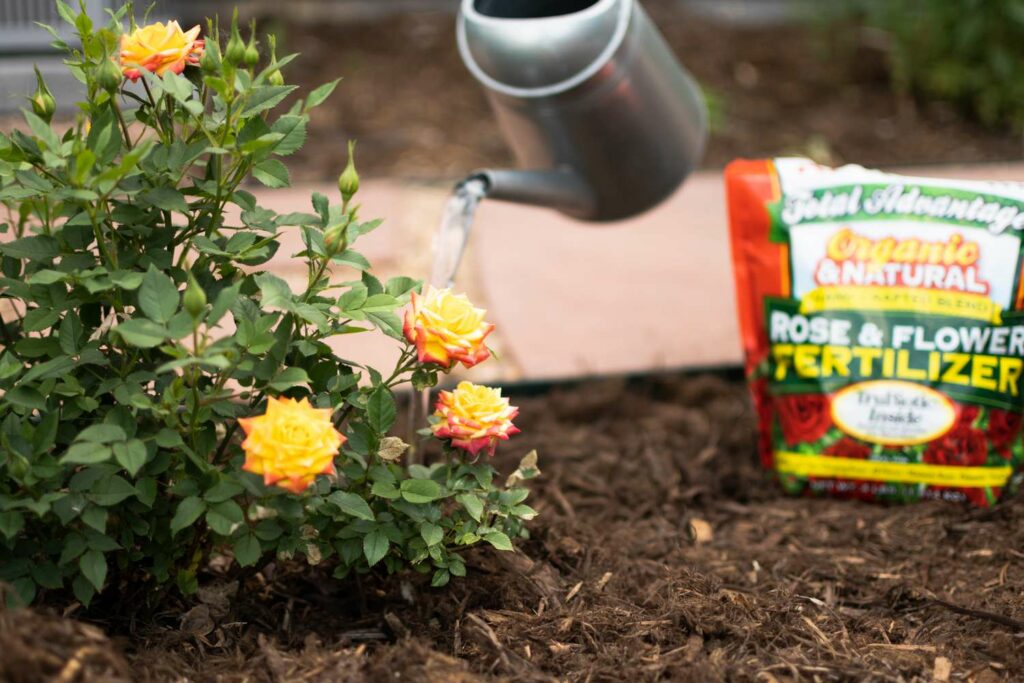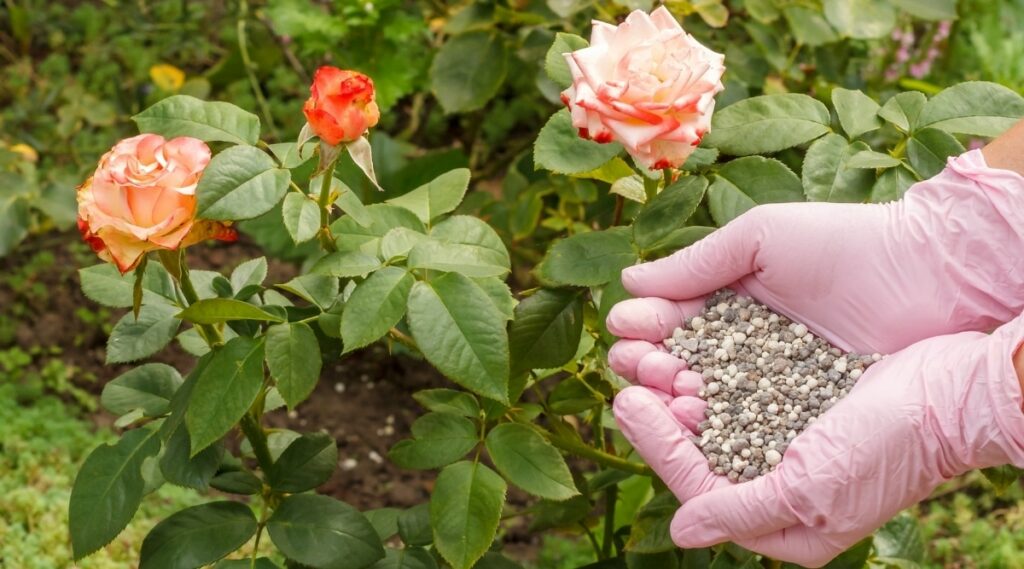Can you use rose food on other plants: Rose Plant Food as Fertilizer
There are all-purpose fertilizers and general-purpose fertilizers. Specific plant fertilizers are also available for fruits, vegetables, and flowers.
Rose fertilizer is particularly developed to help roses bloom faster. However, many gardeners are now asking, “Can I use rose food on other plants?” The answer is yes, you can use rose fertilizer for vegetables as well.
Rose fertilizer was one of the most popular fertilizers on the market years ago and is still relevant. It has the proper amounts of Nitrogen, Phosphorus, and Potassium – an NPK ratio of 4:3:2 – making it ideal not just for roses but also for other vegetable and fruit plants.
However, there is also magnesium, calcium, copper, zinc, iron, boron, cobalt, and water-soluble magnesium. This Rose Tone fertilizer is a bonus for your plants, but only if they are in their initial stages of development.

What Is Rose Plant Food?
Rose food is just a well-designed rose fertilizer. It is nothing special; it just satisfies the nutritional needs of a rose plant. Because so many people grow roses, numerous companies specifically provide fertilizers for this industry.
When we consider fertilizers, we get NPK – Nitrogen (N), Phosphorus (P), and Potassium (K). Typically, we will look at the NPK number, which will be something like 4:3:2 – this means that there is 4% nitrogen, 3% phosphorus, and 2% potassium. The balance of the fertilizer you buy is often the key ingredient.
There are several micronutrient products that provide all of the extra micronutrients that plants require, including iron (Fe), copper (Cu), zinc (Zn), and many others.

The ideal rose food contains the following components:
Nitrogen (4%)
Strong, vigorous leaf growth is aided by nitrogen. Nitrogen is necessary for plants to produce strong roots, stems, flowers, and fruits. Both protein synthesis and plant vigor depend on nitrogen.
Low nitrogen levels cause plants to turn a pale green color and their leaves to become yellow. But too much nitrogen can also harm your plants.
Phosphorous (3%)
Strong, robust roots can grow because of phosphorus. Phosphorus is necessary for your plants’ cell division as well as the growth of their roots, blooms, and fruits. A lack of phosphorus in plants can cause leaf loss, fragile flower stalks, and stunted development. Also, their sprouts won’t open.
Potassium (2%)
To recover from disease, pests, or harsh climatic circumstances, plants require Potassium or potash. Potassium deficit causes stunted growth, weak flower stems, and fading bottom leaves, among other symptoms.
Magnesium, calcium, copper, and zinc are all included in rose fertilizer. There is iron, boron, cobalt, and water-soluble magnesium also present.

Can You Use the Food of Rose on Other Plants?
Plant food flowers may be used for different plants which are in your outdoor garden. Cut flowers such as roses, carnations, iris, and dahlias thrive in them. It’s also ideal for growing vegetables such as tomatoes, peppers, eggplant, cucumbers, and others.
- The NPK ratio in Rose Tone fertilizer is 4:3:2. Some rose fertilizers have higher NPK levels than others.
- Researchers recommend 0.4 KGs of 10:10:10 fertilizer every 10 feet and 0.8 KGs of 5:10:10 fertilizer in the same area. You will need to apply a lot of rose fertilizer to your garden to meet this NPK combination.
- As a result, it is advisable to use rose fertilizers on your specific veggies during the early phases of growth because this is when your crops require a lot of nutrients for optimal root development. However, going organic first is always a better option.
- You can guarantee that your vegetable plants grow properly by adequately preparing the soil before planting and during the early phases of development.
- Add enough fertilizer, compost, mulching, and watering to minimize weed invasion—Rose fertilizer functions as an extra fertilizer for your plants. You may use it on your crops throughout the growing season if they have appropriate nutrients during the early stages of growth.
Because rose fertilizer includes low nitrogen levels, unlike other synthetic and organic fertilizers, your plants will not be burnt.
How Should You Use It on Other Plants?
Because there are so many different “rose food” formulae, providing basic instruction is challenging. Adhere to the instructions on the fertilizer container.
Check to see if the soil is damp in your garden. Don’t overfertilize – certain rose-feeding products include a lot of fertilizer. When we look at this combination, it appears to be a 6:7:6 ratio, yet this fertilizer from natural sources is a 4:8:4 ratio. Although the ratios of the various components vary considerably, if the Nitrogen number is high, you can quickly burn your plants in the garden if you apply too much fertilizer.

Benefits Of Using Rose Food on Plants
- Rose foods are essentially fertilizers. It improves plant growth in the garden, root development, disease resistance, and yield, just like any other fertilizer. Natural fertilizers are favored since they aid in soil strengthening. Natural rose foods will be beneficial in this circumstance.
- It aids in increasing the size of the fruit as well as the productivity of some plants
- It encourages the growth of healthy, strong plants in the garden and, in some instances, improves the flavor of fruits.
- It helps to improve fruit quality and quantity.
Rose Fertilizer Varieties
Rose fertilizer comes in a variety of types. The type of rose fertilizer you use on your plants is determined by the kind of plant and the soil condition. Your decision is also influenced by the temperature and the amount of time you have to devote to your garden.
Rose Fertilizer Granular
Granular fertilizer resembles sand grains and hence seems similar to the soil it is augmenting. Granular rose fertilizer is spread under plants all over the ground, and the soil is scraped with a trowel blade.

Spray Rose Fertilizers
Plants are sprayed with fertilizer, with nutrients traveling through the leaves rather than the roots. You shall apply Spray rose fertilizer with a spray bottle or a hose-end sprayer, available in the market.
Fertilizer for Roses in Liquid
Dissolve liquid fertilizers in water and then administer them to your plants in your home. They make your plants green up much faster than granular fertilizers.
You can apply liquid rose fertilizer every one to two weeks.

Can You Feed Flower Food to Houseplants?
Here Are the Specifics!
Our houseplants are usually ok with a little bit of sunlight and basic water, but every now and then, they may want a little extra feeding boost to develop and be their best selves.
So, can we give flower food or rose food to houseplants? The quick answer is that houseplants cannot be fed flower food. It is futile to provide flower food to your houseplants. It is just meant to be a temporary solution for the flowers and should not be used on the soil or foliage.
Key Takeaways
Can you use rose food on other plants? Yes, rose food is just a properly manufactured and marketed fertilizer. However, if you’re using a 4:8:4 rose food fertilizer, you might save money by switching to a 4:8:4 “vegetable” fertilizer.
When using any fertilizer, including rose food, always follow the instructions. Too much fertilizer might cause your plant to become bright yellow, lose its leaves, and die. Plants require a lot of nutrients, and they grow when they acquire the right ones. Rose plant food is one of the essential plant nutrients and you can use it in a wide range of plants.
